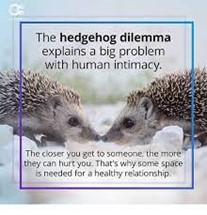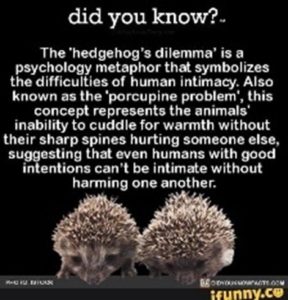Did someone just tell you that your behavior reminds them of the hedgehog dilemma? What are they talking about? This post unpacks everything you need to know about this idiomatic expression. We'll discuss its origin, meaning, and use in conversation.
Hedgehog Dilemma Meaning
The hedgehog dilemma describes the problem with the human condition and our need for contact with others. The experiment symbolizes how we need communication and interactions with others, and we are willing to risk our well-being to achieve this goal.
The hedgehog is a friendly animal, and it has a coat of small spines that protect it from predators. If the hedgehog feels threatened, it rolls up into a ball, and the predator bites down on the sharp spines forcing it to let go.
When hedgehogs get cold, they huddle with each other to get warm. However, the sharp spines cause injuries, forcing them apart. As a result, they end up standing out in the cold by themselves. The analogy from the observation is that human beings also want comfort from other people.
However, if they hurt us, we are more likely to stand in the cold than go back for another try. So, if someone says you have a hedgehog dilemma, telling you to get over your ex and get back into the dating pool.
Hedgehog Dilemma Example Usage
"I really like Carrol, and she likes me, but she won't leave Jeff to be with me because she doesn't want to break his heart. We have a real hedgehog dilemma on our hands."
"My relationships changed during COVID. I went from hugging people every day to staying away from people at a social distance. It felt weird; all I wanted to do was hug someone, But I couldn't; it was a real hedgehog dilemma."


Hedgehog Dilemma Origin
The “hedgehog dilemma” originates from German philosopher Arthur Schopenhauer (1788-1860). Schopenhauer described the act of two porcupines huddling together for warmth in the cold winter air. However, as the animals snuggled together, they would need to adjust because they would prickle each other with their pointy spines.
The hedgehogs will often struggle with each other to get a comfortable position, but most of them end up distancing from each other. The reality is that it's better to suffer in the cold than risk torture for a little warmth in life.
Sigmund Freud adopted the observation in his work to describe the human condition facing modern society and our resistance to traditional Judeo-Christian values and family formations. The hedgehog dilemma applies to our lives when we want something that isn't good for us.
The use of the phrase isn't common in modern language, but some people may understand what you are talking about if they have a background in psychology.
Phrases Similar to Hedgehog Dilemma
- Catch 22.
- Hedgehog situation.
Phrases Opposite to Hedgehog Dilemma
- Harassment.
What is the Correct Saying?
- Hedgehog dilemma.
Ways People May Say Hedgehog Dilemma Incorrectly
Some people may use the hedgehog dilemma to describe the wrong scenario. With the situation, the two or more parties want to be next to each other if one party doesn't want to get close. It's called harassment, not a hedgehog dilemma. So, if you're trying to get next to a girl and she's moving away from you because she finds you repulsive, that would be the incorrect use of the phrase.
Acceptable Ways to Phrase Hedgehog Dilemma
The hedgehog dilemma describes the act of wanting something that you enjoy, but the circumstances of your situation prevent you from achieving your goal. For instance, you might want to go out with your friend's girlfriend, and she likes you too, but you don't want to offend your friend. That would be an example of a hedgehog dilemma.